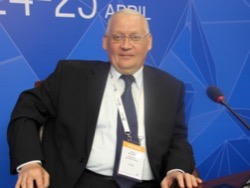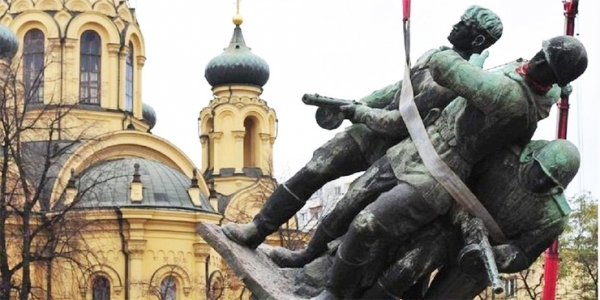
Political analyst Yuri Solozobov — the reasons for the demolition of Soviet monuments and the constitutional crisis in Poland
The Polish Institute of national remembrance (IPN), investigating crimes against the people of the country in the coming weeks will inform the authorities developed a draft of 500 demolition of Soviet monuments, report Polish media.
As stated by the head of the Institute Lukasz Kaminski, monuments were planned to be demolished in early 1990-ies, that they still preserved, testifies to unfinished political transformation in Poland. The initiative is largely anti-Russian character, however, must be interpreted primarily in the context of acute domestic political crisis taking place now in Poland. The culmination of his negotiations began on 31 March in the Polish Sejm, the leaders of all the influential political forces of the country.
According to the President of the IEF, “these monuments symbolize the dominance of the Communist system over Poland and must be destroyed”. The relationship of these events is obvious: the Polish government is seeking to distract people from domestic problems and trying to unite a divided nation fighting against a common enemy. There’s a third reason — to create in Poland a new political consensus, but not associated with the Soviet history.
The reason for this behavior Warsaw has become a growing concern of the Polish society of dramatic political changes in the country. Immediately after the victory of the party “Law and justice” (IPR) in the parliamentary elections late last year began a large-scale purge of the state apparatus and the remaking of the political system of the Third Commonwealth. It is, in particular, on amendments to the laws on the constitutional court (CC), the civil service, prosecution, the intelligence agencies and the media. There was talk about a soon change of the Constitution and the establishment in Poland of an authoritarian regime according to the “collective pain”.
The changes implemented by the ruling party without a dialogue with society has caused tension within the country and abroad. So, the European Commission launched against Poland unprecedented procedure, “relating to threats to the rule of law”. Recently an Advisory body of the Council of Europe on constitutional law, the Venice Commission acknowledged that “the Polish authorities have violated the Constitution by limiting the influence of COP”.
Throughout Poland were held thousands of demonstrations under the slogan “Restore constitutional order”. The opposition talks about the serious dangers of the government’s actions for the image of Poland in the international arena and the destruction of the legal system within the country. Polish politics since the struggle against communism like Lech Walesa started talking about creating Solidarity 2.0 and the threat of civil war this spring.
The ruling party IPR a long time did not give much importance to the statements and rallies by opponents. Warsaw pointedly pretended that the decision of the European Commission and the scandalous verdict of the Venice Commission it is not particularly care about. For screamers like former President Walesa was the suitcases of the compromising evidence. So much so, that the head of the COP Andrzej Rzeplinski stated that his life may be under threat. In Polish society there was a sense that political reforms can go on the Latin American scenario. This circumstance and insoluble the scandal surrounding the COP were the impetus for negotiations in the Sejm.
The chief negotiators were the leader of the ruling party IPR Kaczynski, head of the opposition party “Civic platform” Schetyna. They showed a willingness to compromise. Even Jaroslaw Kaczynski has said Polish radio that he did not intend to change the Constitution and not seek a majority in the COP. However, most observers regarded this gesture as soothing rhetoric. The representative of such kind of clubs “Cookies’15”, the poles called “the glove of IPRs”, said that “only a change in the Constitution to resolve the conflict over the COP”. Therefore, the other parties expressed cautious optimism and hope “that the meeting will be a real dialogue, not a monologue Piece.”
As a result, the debate in the Sejm were only first steps in a difficult political debate, leading to the promise to change the law on the constitutional court.
Before the start of the debate, some observers compared them with a round table of 1989. Recall that this negotiation format led to a political compromise that allowed blood to move to a new social order. The meeting was actively participated by interior Minister General Czeslaw Kiszczak, as well as a number of modern politicians of Poland. Including Jaroslaw Kaczynski — then a humble lawyer, adviser to the strike Committee.
Kaczynski, and other participants of the round table, known for an important but still ignored the fact. Of agreement between the opposing forces of Poland were achieved with the active participation of Moscow, used the policy of carrot and stick. In 1989 the USSR, are experiencing a difficult time, delivered to the Polish economy food aid and the necessary resources — oil, gas, cotton, and ore — half the international price. Moscow hinted and hard scenario in case of failure of negotiations — possible introduction of troops. Declassified documents suggests that the current Third Polish-Lithuanian Commonwealth created with Soviet assistance. Can, hence the desire of the current government to permanently erase from the memory of the people of the Soviet monuments?
The main question today is — who will turn in the right direction new of the Polish round table? Brussels (or Germany), which are associated with the opposition, or Washington, having a considerable influence on the leaders of the IPR. Does the West desire and need resources to bring opposing forces in Poland to compromise? Or the poles themselves will find the strength for national unity?
As for Moscow, it was not a moderator of the round table. It is necessary to Polish a new consent was not unequivocally anti-Russian, understood as the unity of the poles in the face of threats from the East. About what direction policy of Warsaw is growing, just shows a large-scale action on the demolition of monuments.
An important role in stabilization and normalization of our relations can play the direct negotiations between presidents of Russia and Poland. Formally, this working meeting will be devoted to the problem of transit, but it could discuss a wide range of our problems. The main thing is to show Warsaw that civil peace in neighboring Poland — one priority for Moscow, but under one condition — the historical memory should not be forgotten.








